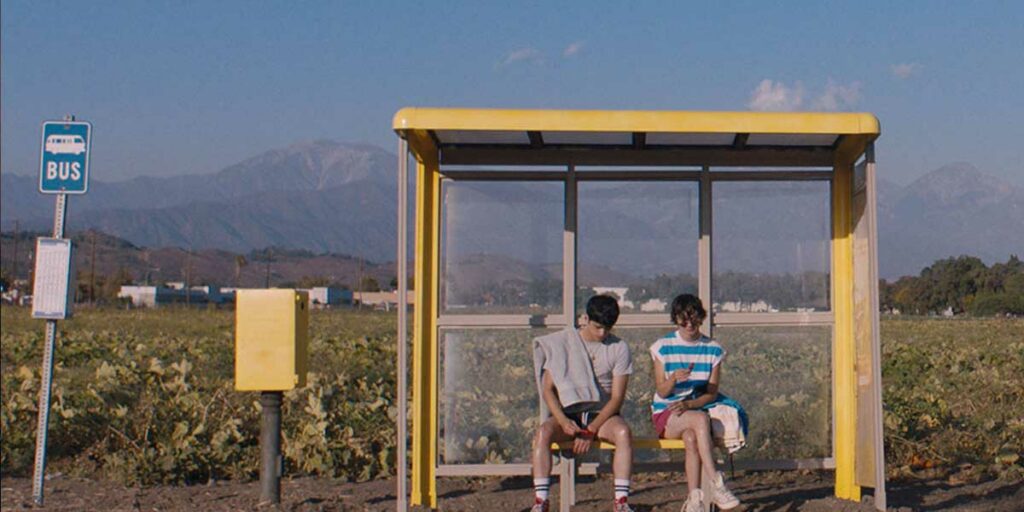Aristotle and Dante Discover the Secrets of the Universe is a realistic yet enchanting intersectional romance, encapsulating the anxieties and fascination of exploring identity.
Reminiscing on popular coming-of-age movies, a handful come to mind: The Perks of Being a Wallflower, Lady Bird, Paper Towns, and The Edge of Seventeen. Many of these films concern the same demographic of white, middle-class teenagers and their first glimpse at what they consider the real world as they earn their first bit of freedom with age — getting their first car, dating, school dances and sneaking out of their parents’ house. Aristotle and Dante Discover the Secrets of the Universe sheds light on this same coming-of-age experience, but the one experienced by two teenage boys in El Paso, Texas, discovering their identities as queer, Mexican-Americans.
It’s the summer of 1987, and Aristotle (Max Pelayo) leads a barren life: he has an empty bedroom, he stares at the wall in his free time, and his brother is in jail for a reason his parents won’t discuss. And he can’t swim. Until he meets Dante Quintana (Reese Gonzales). As Dante sits on the edge of the pool and watches Aristotle haphazardly fling his limbs around in the shallow end, he offers to teach Aristotle, or Ari, to swim. Dante introduces himself to Aristotle, and when he tells him his name, Ari just laughs. Dante assumes he is making fun of him, but Ari responds with, “No, it’s just that my name is Aristotle.”
Aside from their names, it’s evident that Aristotle and Dante’s friendship is fate. Both struggling with their identities, Aristotle and Dante both need each other and complete one another. Whereas Ari is conventional and ordinary, Dante is ornate and whimsical: he refuses to wear shoes, clothes himself in bright colors and fills his time with music, art, television and skateboarding. Where Aristotle calls himself a “real Mexican,” Dante is called a “pocho,” or a “half-ass Mexican.” Ari comes home to a cramped one-story house; Dante comes home to a spacious two-story home with a hatchback perched in the driveway. Ari’s father has rough, tanned skin and worn hands from outdoor labor; Dante’s father is an English professor. Where Dante is outwardly emerging into his queerness, Aristotle perpetually represses it.
Aristotle and Dante spend time together doing what teenagers did during 80s summers: swimming, licking popsicles, riding the bus, camping, and tying their Converse together — one red shoe and one white shoe, a symbol that becomes emblematic or Ari and Dante’s relationship throughout the film — and throwing them onto power lines.

Dante moves to Chicago for his dad’s job at the University of Chicago, and ironically, this is when Ari and Dante become closest. Dante sends Ari letters throughout the year updating him on his life. Through the letters, we see Dante fall in love with the city, go to parties, and begin to kiss girls, an experimental phase that evidently makes Ari jealous. Over the course of reading various letters, the audience sees Dante begin to discover his sexuality and prepare to come out to his parents, while Ari remains repressing his sexuality and simmers in self-denial. Seeing Dante live a life away from Ari, and only hearing of him through Ari’s readings of his letters truly allows viewers to see the juxtaposition of Dante’s life in Chicago and Ari’s slower life still in El Paso. It also allows viewers to fully embrace the film from Ari’s point of view.
Ari represents what many queer children of immigrants experience: self-suppression as a defense mechanism to the expectation of unsupportive parents due to cultural differences of the LGBTQ+ community. The audience is initially led to think that Dante, as a white-passing Mexican-American from an upper-middle-class family, has the privilege of being openly gay whereas Ari doesn’t. However, Dante’s queerness becomes an issue once he moves back to El Paso.
The last third of the film explores Ari’s self-denial becoming dismantled and the tremendous emotional, physical and mental adversity Dante has to face in order for Ari to finally have self-realization. It proves once again Dante and Ari needed to discover each other in order to survive and discover themselves.
At the end of Call Me By Your Name, Mr. Perlman (Michael Stuhlbarg) gives a speech of intimate fatherly love to his son Elio (Timothée Chalamet). Elio fell in love with Oliver (Armie Hammer), a graduate student who stayed with him and his family over the summer at their home in Italy. After Oliver leaves to go back home to the U.S., Elio’s father tells him it is essential to feel pain and grief, rather than to suppress what he felt for Oliver, and assures Elio that he, as a father, is supportive of Elio’s homosexuality. Similarly, Ari’s parents give him tender, loving and solemn words about his sexuality — dialogue that many real people in Ari’s position may not have the privilege of hearing. But if they cannot, this film gives them the words they may need to hear.
Ari states he didn’t believe in magic until he met Dante. That is exactly how this film feels: magical yet raw, portraying a story of ethnicity and sexuality that many are able to identify with. Aristotle and Dante Discover the Secrets of the Universe is a faithful adaptation to the book of the same name that depicts the real adversity, anguish and awe of discovering the world while holding someone else’s hand.
Aristotle and Dante Discover the Secrets of the Universe will be released in US theaters on September 8, 2023.

